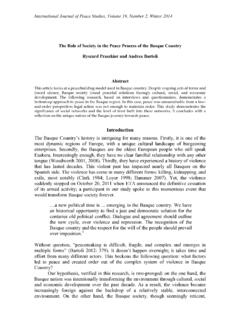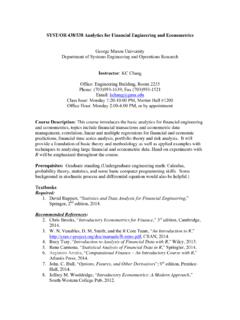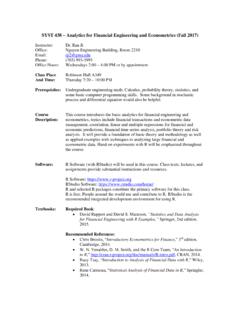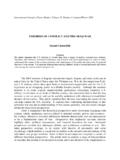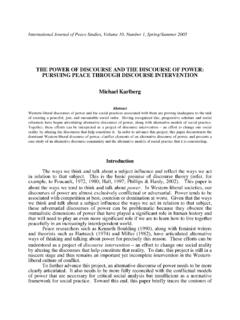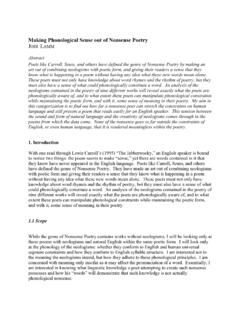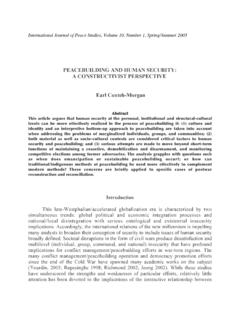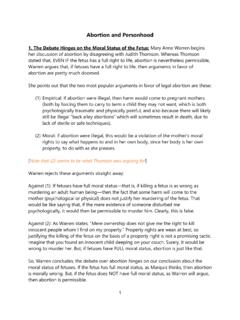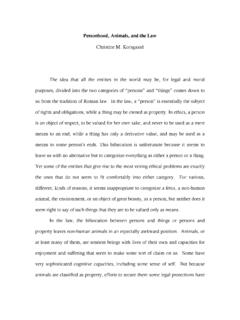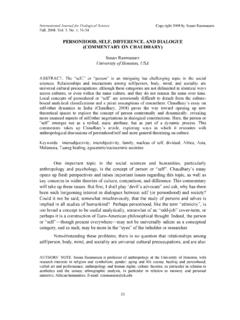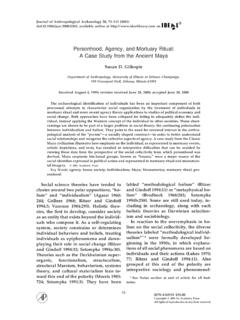Transcription of MORAL PERSONHOOD AND HUMAN SECURITY Laurie …
1 International Journal of Peace Studies, Volume 10, Number 1, Spring/Summer 2005 MORAL PERSONHOOD AND HUMAN SECURITYL aurie CalhounAbstract:The concept of MORAL PERSONHOOD is fundamental to what is supposed to be secured by thedefense institutions established by HUMAN beings in order to protect themselves. All leaderswield MORAL rhetoric, but only some national defense policies promote HUMAN SECURITY ; andpolicies do not reflect a MORAL perspective when they apply different MORAL principles to thepeople of different lands, for one s place of residence is manifestly irrelevant to one s moralpersonhood.
2 In addition, the practices of modern military institutions are difficult toreconcile with the MORAL requirements widely accepted to constrain legitimate self-defense,and policies that lead to the slaughter of innocent people and their perfunctorycharacterization as collateral damage effectively negate the MORAL PERSONHOOD of thevictims. The aspersion of enemy leaders as evil is counterproductive to the aims of humansecurity, effectively precluding the possibility of constructive dialogue and thereby increasingrather than decreasing the probability that a conflict will escalate to Perspective of MoralityThere are many different ways of thinking about the world in which we live, eachof which represents a perspective, a point of view commencing from a set of values andinterests.
3 Sometimes we adopt an aesthetic stance, evaluating things in terms of conceptssuch as beauty and symmetry. Sometimes we adopt an economic stance, assessing thingsin terms of monetary value and net efficiency. At other times we prefer to regardourselves and others as objects of scientific study, which can be described in naturalisticterms. Within science, there are several different layers of description from which tochoose. According to evolutionary biologists, we are but animals that have evolved fromprimordial sludge into conscious beings.
4 According to physiologists, we are collectionsof organ systems, while according to biochemists we are complex agglomerations ofmolecules. But all of these different views represent the perspectives of conscious conscious agents, we regard ourselves as persons, with perspectives, values,interests and beliefs. The MORAL perspective, in contrast to aesthetic, economic, andscientific views, commences from the idea of MORAL worth and the entities that possess PERSONHOOD and HUMAN SecurityThe fundamental premise of the MORAL perspective is that persons have a special sort ofvalue or dignity that non-persons do not.
5 To adopt a MORAL perspective toward otherpeople requires that we regard them as having intrinsic value, a MORAL worth equivalent toour own. The MORAL perspective forms the basis of our societies, which are governed bylaws established by MORAL persons precisely in order to protect MORAL persons from embrace a MORAL perspective is to accept what is sometimes referred to as the overriding nature of MORAL considerations. Convenience, prudence, economics,aesthetics, and all other perspectives must be set to one side when morality is at the MORAL perspective commences from the ascription of consciousness andsentience to other persons, national SECURITY policies which ignore this essential quality ofmoral persons cannot with linguistic propriety be described as genuinely MORAL policies are often defended through the use of MORAL rhetoric.
6 However, when theessential value of conscious and sentient PERSONHOOD is flatly denied, or brushed aside asirrelevant, the policies in question have prioritized non- MORAL interests and overriding quality of morality forms the basis for the widely shared idea thatwars may only be waged as a last resort, for nothing could justify war, which culminatesin the annihilation of persons, but the direst of circumstances. An optional war, one thatdoes not need to be waged, could only be an immoral war; for if there is a pacific option,which can avoid the slaughter of HUMAN beings, then it must, morally speaking, bepursued.
7 Similarly, a war waged to protect economic interests could never be MORAL , foreconomic considerations cannot compete with the MORAL perspective, which asserts theabsolute value of conscious HUMAN life. Wars waged for oil, to acquire new territory, orto protect the economic interests of a country, do not reflect a MORAL , at the political level, discussions of war among diplomats oftenprioritize an economic perspective. The representatives of nations bargain with oneanother, compromising and making concessions in exchange for economic benefits.
8 Onthe one hand, this is entirely understandable, for the people charged with protecting theinterests of a nation are generally focusing upon quasi-prudential as opposed to moralmatters. Often prudence and morality become conflated, when the economic interests of anation are assumed by government officials to coincide with the interests of the when governments are bribed or extorted to support a war that they would haverejected of their own accord, a war which leads to the annihilation of HUMAN beings(albeit the citizens of another nation), then there is a sense in which those governmentshave been corrupted, at least according to a MORAL assessment of what has transpired.
9 Insome cases, such as those of poor African nations faced with the specter of allowing evenmore of their own citizens to perish due to the withdrawal of aid from a wealthy nationcourting their favor, morality may be sacrificed for prudence, though the leaders ofnations who succumb to bribery and/or extortion undoubtedly reason along quasi-utilitarian lines and under the assumption that their first priority must be to the people oftheir own nation, rather than the prospective victims of a war waged Calhoun89 The tendency of government officials to substitute economic for moralconsiderations, as though the productivity of a nation directly reflected the well-being ofits citizens, is symptomatic of a more general trend among intellectuals.
10 Throughout thetwentieth century, the ascendancy of science has directed many intellectuals involved innormative areas of HUMAN endeavor toward the goal of a quasi-scientific paradigm. Inscience, the perspective of individual subjects is an irrelevant hurdle to be cleared inorder to arrive at objective knowledge about the state of the world. However, to disregardthe subjective experience of individual centers of consciousness, assimilating them withinsentient, non- MORAL things, is to invalidate the very basis for morality, for the peculiarvalue of MORAL persons inheres precisely in their unique status as conscious agents,susceptible of pleasure and pain, and embodying a MORAL worth which transcends thepurely physical sum of their pervasive error of prioritizing the third-person perspective in theories ofvalue, while disregarding the first-person perspective.

